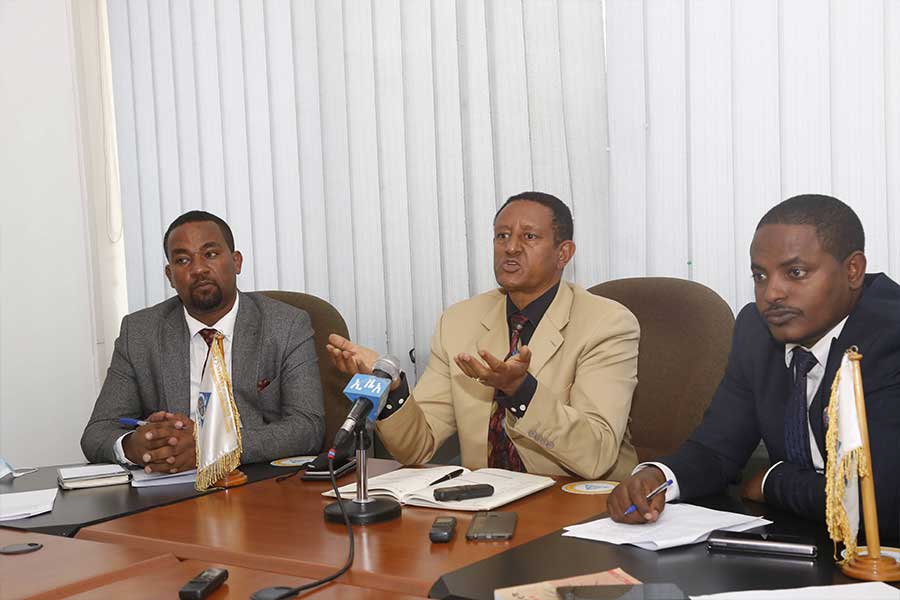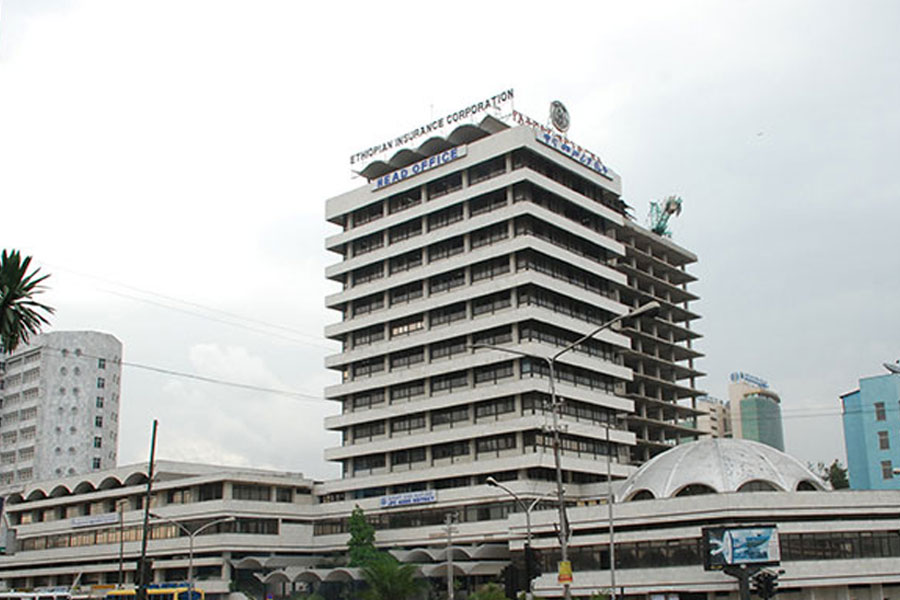
Radar | Dec 15,2024
Erget Tareke is one of the 4,000 residents of the Bole Bulbula condominium that penned a letter to the Addis Abeba Revenues Bureau pleading for postponement of the revised property tax.
She became a proud homeowner of a three-bedroom condominium house four years ago, but the partially finished accommodations lacking electrical lines and a sewerage system prevented the family from moving in. Following the retirement of her husband from the military a year and a half ago, they had to leave the residential camp near the Signal area and confront the challenge of living with their six children.
"My husbands' pension is our only income source," she told Fortune.
Besides the 3,000 Br pension fund, Erget has been seeking financial assistance from relatives abroad to pool in much-needed financial support. However, the 40-year-old is experiencing anxiety due to the impending tax and is unsure about the obligation to pay taxes on an unfinished property.
"We're using remnants of the infrastructure that the contractor left," she told Fortune.
Condominiums housing projects are a subsidised housing initiative from two decades ago that sought to provide homes to urbanites who managed to save a certain portion of the construction costs, with the city administration lending the rest in 40:60 and 20:80 schemes.
Although they were previously exempt from taxes, these properties are now subject to newly recalibrated property tax rates that consider factors such as construction materials, property purpose, and location when calculating taxes.
A residential condominium unit with a 120sqm size, similar to Erget's house, is set to have its owner subjected to an annual property tax of around 13,871 Br per the revised rates.
Homeowners dismayed over the scheme that included incomplete infrastructures from eight community associations across the 52 blocks of the Bole Bulbula condominium sites came together under a single union to file a complaint to the city administration.
Yohannes Fantahun is a member of the steering committee behind the 4,000-strong union. He has saved up his 40pc share and was given a grace period by the Addis Abeba Housing Development Corporation for full payments as his house remains incomplete.
Property tax discussion organized by Addis Abeba Chamber of Commerce & Sectorial Association
He questions why the same courtesy could not be applied to the property taxes that was sprung on the residents a couple of months ago. Yohannes claims that representatives have been scouring the Weredas at the Bole district over the past 12 days trying to find a tax appeal hearing committee to no avail.
"Our pleas have fallen on deaf ears," he told Fortune.
The Addis Abeba City Revenues Bureau, headed by Adem Nuri, dispatched the revised property tax rates in April. The bureau outlined plans to collect up to nine billion from property tax in the forthcoming budget year.
Adem stated that districts were ordered three weeks ago to form hearing committees comprised of members from land management, finance and revenues bureaus to tend to disputes between taxpayers and collectors. He said that the human capital shortage has impeded the formation of committees up to the Wereda level while the degree of completion of the homes is considered before the taxes are levied.
"The taxes will pay for the infrastructure," Adem told Fortune.
The Woreda 12 Administration Bureau, which has 86,000 households, including the Bole Bulbula condominium residents, receives at least three complaints a day related to the property tax.
"We don't have a properly formed committee," said Zerihun Teka, head of the Bureau. He explained that Weredas does not have the mandate to grant grace periods but has readjusted rates for two residents based on their claims.
Several businesses in the capital have also had their feathers rattled upon hearing of the imposition of the revised property tax rates. Landlords have plastered announcements on the walls of their buildings informing tenants of an upcoming rental fee increment a day after the restriction set by the city administration expires in July.
Rehima Dagne runs a small gift shop inside the KKARE Building, located in the heart of the capital around the Mexico area. She sells chocolates, flowers and photo frames in a small six square metre shop on the second floor.
The building administrators plan to call a meeting with all the tenants for a discussion on a possible raise. However, poor market conditions compounded by inflation and a 10,000 Br rental fee have the 27-year-old at the breaking point.
"I'm closing up shop if rent increases; I just can't afford it," she told Fortune defeatedly.
Officials at the Addis Abeba Finance Bureau are confident the tax burden will not corner tenants. According to Asmamaw Mulugeta, the coordinator of the property tax project at the Bureau, they have conducted studies that indicate the burden of taxes will be restricted to homeowners.
"We recommended continuing the ban on increasing rental fee will prevent the burden from being passed on to tenants," he said.
Close to 602 million Br has been collected through the revised rates from 91,000 taxpayers as of last week—a stark increase from the total 47.5 million Br collected from 182,000 taxpayers the prior year. Mayor Adanceh Abiebie disclosed that only 0.7pc of commercial building owners have settled their property taxes, while condominium owners consist of 62pc of the paid amount, in her recent interview with Ethiopian Broadcasting Corporation.
Last week, multiple stakeholders held a discussion with officials from the city administration organised by the Addis Abeba Chamber of Commerce & Sectorial Association at the Inter-Luxury Hotel on Tito Street.
President of the Chamber Mesenbet Shenkute kicked off the session by explaining that it is an awareness creation session on the restructured rate.
The moderator Getu Jemaneh, CEO of HST Consulting Trading, took centre stage, inviting Yohannes Woldegebriel, director of arbitration at the Chamber and Yared Halilmeskel, an investment consultant, while Addis Abeba City Revenues Bureau Head Adem Nuri and Property Tax Project Coordinator Asmamaw Mulugeta joined from the city administration.
Both Asmamaw and Adem told attendees that the prior rate barely covered administration costs, and taxes were the only solution to cover the increasing capital expenditures that account for half of the city's budget. They stated that the concept of property tax is nothing new, with mere readjustments done in the calculation, which remains on the lower curve when compared to neighbouring countries.
A heated argument followed the presentation from panellists representing the private sector and attendees of the event.
Yohannes contested the historical roots of the tax and the necessity for such an expanded revision by members of the city administration. He argued that the 1975 proclamation, which ushered in property taxes came about during a communist political order which actively objected to private property ownership.
He argued that several modalities for property ownership and real estate development have changed over the past three decades, and a mere revision of rates is incompatible with the current legal framework.
"It's a decision made in the spur of a moment," he said.
Yared concurred, stating his assumption that the wave of taxes and austerity measures arise from requests from international financiers like the World Bank, who request structural reforms before debt restructuring.
He emphasised the need for public hearings before a tax that could lead to mass evictions and sweeping displacements is imposed and questioned if the new taxes had anti-poor leanings.
Concerns over the timing of restructuring the tax rates while the Ministry of Finance is working on the proclamation were raised among attendees.
Kedier Seid, an engineer, and architect conducting research on property valuation, indicates that property taxes are a common tool worldwide for covering budget deficits. However, he believes that the 4.5pc multiplier used by the authorities is much higher than international rates, which typically fall between 0.25 and 1.2pc.
He reasoned that inclusion into the cadaster system should come before trying to impose taxes as the number of houses is not exactly known.
While the city administration maintains that the 182,000 taxpayers so far are small considering the one million households eyed by the revised taxes, residents like Erget remain trepid over their futures as a 33.4pc inflation rate hovers above the economy.
PUBLISHED ON
Jun 24,2023 [ VOL
24 , NO
1208]

Radar | Dec 15,2024

Radar | Jan 18,2020

Editorial | Jun 28,2025

Fortune News | Aug 30,2025

News Analysis | Jul 28,2024

Radar | Mar 28,2020

Fortune News | Mar 20,2021

Sunday with Eden | Oct 25,2025


Fortune News | May 08,2021

Dec 22 , 2024 . By TIZITA SHEWAFERAW
Charged with transforming colossal state-owned enterprises into modern and competitiv...

Aug 18 , 2024 . By AKSAH ITALO
Although predictable Yonas Zerihun's job in the ride-hailing service is not immune to...

Jul 28 , 2024 . By TIZITA SHEWAFERAW
Unhabitual, perhaps too many, Samuel Gebreyohannes, 38, used to occasionally enjoy a couple of beers at breakfast. However, he recently swit...

Jul 13 , 2024 . By AKSAH ITALO
Investors who rely on tractors, trucks, and field vehicles for commuting, transporting commodities, and f...

Nov 1 , 2025
The National Bank of Ethiopia (NBE) issued a statement two weeks ago that appeared to...

Oct 25 , 2025
The regulatory machinery is on overdrive. In only two years, no fewer than 35 new pro...

Oct 18 , 2025
The political establishment, notably the ruling party and its top brass, has become p...

Oct 11 , 2025
Ladislas Farago, a roving Associated Press (AP) correspondent, arrived in Ethiopia in...